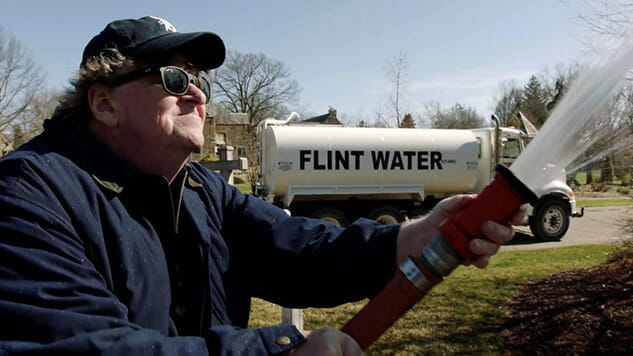Fahrenheit 11/9

Watching Fahrenheit 11/9 is like walking into an intervention only to find out that the meeting is about you. It’s not unreasonable, with Michael Moore at the helm, to expect another liberal circlejerk that exposes our president for the racist, misogynist, criminal, traitor, etc. he is. The past three years have been chock full of “epic takedowns” of #45 in the form of op-eds, TV talking heads and documentary material, offering Americans and the rest of the sensible world a placebo to make them feel self-satisfied and moderately sane. Do we really need our self-smug thoughts about the terrifying direction in which the country is going pumped back into our heads like an ouroboros of ideology?
What Moore offers instead is a stern finger pointed at us, all of us. Our inactivity against and complicity in the slow-moving moral corrosion of our political system resulted in Donald Trump. Fahrenheit 11/9 is a painful but necessary sit-down with the American people to tell us that we all fucked up, that we need to get to work if there’s any hope to save this experiment called democracy. Moore’s film is surprisingly light on bashing He Who Should Not Be Named. What could he say that we don’t already know? All we get out of him is a brief moment where he calls the current POTUS a “malignant narcissist.” That’s more than enough. This is no conspiratorial doc demonstrating how Russia put him in power, either. What it is about is how we remain silent as the world dies around us—sometimes literally, as in the case of the Flint water crisis.
Moore opens his film with the fateful election night of 2016. Instead of focusing on the devastation felt on the Democratic side post-election, he spends most of this pre-credits sequence remembering how pretty much everyone was celebrating Hillary Clinton’s win even before the votes were counted. Surely his opponent, the pathetic dictator wannabe, would never become POTUS, no matter how far his farce had gone. Moore establishes his theme: Americans, Moore’s audience, have been too comfortable in the belief that our democracy cannot be rattled, let alone toppled, for far too long, leading into a passionate, boisterous, two-hour-long rallying call for action.
Two sequences stand out as a mirror to one another: The first, near the beginning of the film, lists all of the horrendously racist, sexist and—in the case of his creepy obsession with his daughter Ivanka—vomit-inducing happenings of Trump’s past. We all knew them before 2015, yet why wasn’t there more outcry when this person kept being the reality star of a major network while peddling the conspiracy theory that the then-current POTUS isn’t American solely because he’s black? How the media, while seemingly condemning his bigoted and despotic positions, gave him free reign for the sake of ratings? The second sequence, near the end, expands on our indifference: Why didn’t we speak up more as the rich got richer, act more as the poor got poorer, as our civil rights were stripped in the name of safety, as we saw even our most beloved political figures engage in corrupt donor class cronyism? We all know the house is burning now; Moore attempts to figure out where the sparks came from.
-

-

-

-

-

-

-

-

-

-

-

-

-

-

-

-

-

-

-

-

-

-

-

-

-

-

-

-

-

-

-

-

-

-

-

-

-

-

-

-








































